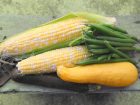Book Review: The End Of Food by Paul Roberts
Review by Darel Anderson
Roberts believes that our world food supply system is inefficient for a number of reasons and could easily collapse. To avoid famine and a disruption in the food supply, we need to apply reductionist policies such as local supply chains and organics to the system. He calls for a more regional food system.
Our food system is based on an economic system that is unsuited to mass production. The pitfalls of this high demand system are unhealthy food, unethical treatment to animals, hunger and obesity and unsustainability, which are inherent to the system. Surplus of this system impart specialization and social inequality. It also demands design for uniformity – an aid to harvest and process, a necessary principle for industrialized farming. In order for our system to provide an abundance of cheap food, producers are forced to use these processes that grow and raise food in a fast manner often to the detriment of healthy and sustainable considerations. Therefore, the proficiency of this system has started to kill us.
Cheaper foods tend to be more caloric. Foods such as; pretzels, cheese puffs, white bread, cake mixes, ready mix foods etc. are all relatively inexpensive in comparison to their high calorie content and are readily purchased for their low-cost and convenience rather than their nutritional value.
American farm policy is a permanent cycle of overproduction and falling prices. Even though commodity prices have had marginal gains recently, input costs such as; insurance, fuel, chemicals, replacement parts and repair labor etc. have skyrocketed in that same period. Farm subsidies allow U.S. farmers to export grain for less than the cost of production. External costs have shifted to unregulated countries hence unsustainable tendencies abound in the modern world food system. If grain for export, to third world countries, is subsidized and therefore made artificially expensive by the government of the producer country, those in need of the grain will not be able to afford it. On the other hand if imported grain is made too inexpensive local farmers in these third world countries can’t compete. The danger of the emergence of a food system geared toward high volume, low costs, and rapid worldwide distribution is that if a problem in food safety, transportation or inability to pay occurs famine could be the result. The solution Roberts states is to grow food for local consumption.
Much of the problem lies in the personnel of the regulators itself who represent or have an interest in, industrialized agriculture. The USDA today the author states is less like the industry’s regulator and more like its marketing arm. The FDA examines less than 2% of imported food shipments because the workload is just to great for the large volume of production. Pathogen risks are magnified by the increase in industry output and cost control. Consolidation and integration, which drive down cost, makes controlling pathogens difficult. We as a nation evaluate our food system as our capacity to generate cheap food by externalizing the real cost of our food so it appears to be cheap. Consumers don’t feel they should pay for the added value of food safety. By always keeping cost low we also lower food security.
The author calls for a decentralization of the food economy. He states that hyper-efficient factory farms are less efficient due to pollution and water use. Rain fed agriculture generates five times the calories as irrigated crops. He also goes after big seed supplies that invoke terminator genes in their seeds to render the progeny sterile.
The fact that the food system is in fewer and fewer hands should concern everyone. Roberts asks, do subsidies to big scale farmers perpetuate unsustainable practices such as; over production, artificially cheap food, and monoculture cropping? Our food system as it is today is tightly integrated and reliant on other sectors therefore discrete failure is not possible.
The solution is for a regionalized food economy. Food safety and security has to be pulled from the shadows of advocacy politics and industry lobbyists. Roberts calls for diverse and decentralized ways instead of centralized, uniform, concentrated practices that convert to a less economically viable product, which is more vulnerable to disruption.
The food system in the end is shaped and driven by the market. The mega-giants such as Wal-mart, Tyson, Monsanto etc. and others are not just providers of food but the arbiters of ideas and attitudes about food. But only because we give them power when we purchase their products.
Darel Anderson is a wheat and vegetable farmer from Wall, South Dakota.
Similar Stories:
- Health and Environmental Hazards of GMOs: An Annotated Bibliography.
- Local Food Is Elitist? Part I
- Five Myths About Food Safety and Home Gardens
- Why Buy and Eat Locally?
- Federally Funded Grants for US Farmers



